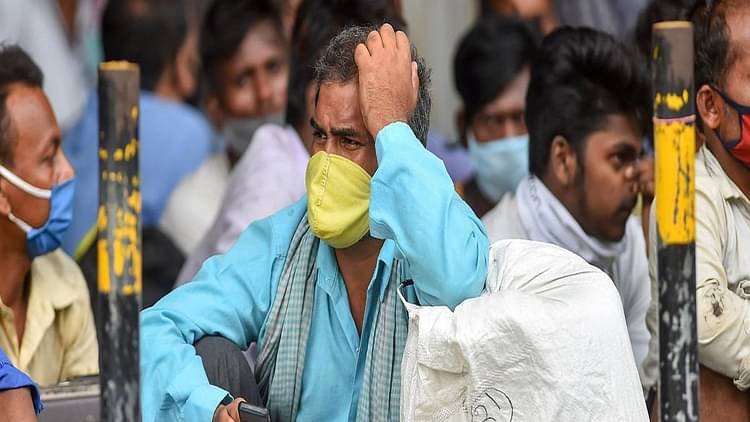As the peak of the second wave of the COVID pandemic begins to slowly recede, the havoc wreaked on lakhs of families has been occupying the attention of the whole country. There is widespread dismay and anger at the way the health emergency caught the Modi government unprepared. Its mishandling and unscientific attitude turned it into a catastrophe for the people.
From amongst the debris of the second wave, another calamity is emerging, that is the economic one. Millions have lost their livelihoods and are jobless; small businesses and shopkeepers are ruined; many households are in debt and hunger is rampant.
The Gross Domestic Product (GDP) figures of 2021 announced by the National Statistical Organisation show a 7.3 per cent contraction, the worst performance in the last four decades. Every sector of the economy, except agriculture, shows a fall in output.
The government is pointing to the growth of 1.6 per cent in the fourth quarter (January to March 2021) as a sign of recovery. But the situation is only going to get worse with the impact of the second COVID wave between April and June and the various lockdowns which had to be imposed across states.
Some indications of the seriousness of the crisis are already evident. The rate of unemployment in May was nearly 12 per cent – according to the CMIE. Urban joblessness rate was nearly 15 per cent in the same month. The growth of India’s domestic factory orders and production in May was the lowest in the last 10 months. Household consumption dropped further; with no demand, investment is not forthcoming.
It is at such a time, that the government should have stepped in with increased government spending. It is only government expenditure in the form of cash subsidies, job allowances, increased MNREGA expenditure and increased credit to small and medium enterprises that can provide relief and put purchasing power in the hands of the people, stimulate demand. Increased public investment in infrastructure and rural development would also help in the medium and long term.
Just about everyone, except a few diehard, fiscal fundamentalists, are calling for more government spending. The president of Confederation of Indian Industry, Uday Kotak, has called for a big economic stimulus including cash subsidies.
The former finance minister, P Chidambaram, has called upon the government to spend more by borrowing or even printing money. So have a whole range of economists and public finance experts.But the Modi government remains impervious to all these pleas. The finance minister, Nirmala Sitharaman, has in an interview, in response to a question on fiscal stimulus, replied that ‘let the budgeted expenditure reach the people first’. She said that the budget has already provided for a COVID-related expenditure package.
But this is a hollow claim. The budget of 2021-22 has provided for a government expenditure of Rs 34,83,236 crore while Rs 34,50,305 crore was spent in 2020-21, which means that only Rs 32,931 crores of extra spending is provided for in 2021-22.
A close look at the budget provisions show that there is hardly an increase in MNREGA allocations and food subsidy. Most glaring of all is the sleight of hand in the health budget, where actually there was barely a 11 per cent increase over previous years’ expenditure on health and family welfare.
The government has obstinately refused to provide cash subsidies for the poor and needy. Since the middle of last year, opposition parties have been demanding that cash transfer of Rs 7,500 a month be made to all non-income tax payees. But the government has not budged on this.
During the second wave, all that the government has done is to renew the scheme of 5 kg of foodgrains to all those covered under the Food Security Act for a period of three months. However, the 1 kg of dal which was provided last year has been discontinued.
The Modi government is unwilling to follow the policies adopted by the United States and UK governments where the neoliberal policies originated.The Trump administration and now the Biden administration have together provided over $5 trillion in fiscal stimulus and cash transfers which amounts to 27 per cent of GDP.The UK government has spent an equivalent of 17 per cent of the GDP in fiscal stimulus, which includes employment support and cash transfers.The additional expenditure incurred by the government in India is just 2 per cent of GDP.
The Modi government in India has worked to enrich the big corporates and private financial interests during this period. It had reduced corporate taxes and in both the 2021-21 and 2021-22 budgets and proposed to raise Rs 2.1 lakh crore and Rs 1.75 lakh crore by selling off or disinvesting the public sector units. That it could not come anywhere near to achieving this target is another matter.
The BJP government’s fealty to neoliberal policies during the pandemic has led to the obscene spectacle of rising stock markets and the gross enrichment of the owners of big business and financial speculators, both Indian and foreign. As a result, there was an increase of 55 billionaires in India in 2020 and a 35 per cent increase in the wealth of the top 100 billionaires in 2020.
On the obverse side, there is widespread economic distress manifested in the plight of migrant labour, informal workers, rural labour and the impoverished millions who are jobless, indebted and victims of hunger and malnutrition.The government has refused to raise corporate taxes, impose taxes on capital gains or wealth tax in order to raise resources for additional spending. Instead, it is seeking to make up the fall in revenues by exorbitant levies on petrol and diesel.
It is shocking that at the height of the COVID wave, after the results of the assembly elections on May 2, the price of diesel and petrol was hiked 17 times in the rest of the month. The price of diesel went up by Rs 4.65 per litre and petrol by Rs 4.09 per litre in May alone.
The increase in the wholesale price index and inflation is a result of the sharp increase in the prices of petroleum products which as a universal intermediary affected the prices of all other goods. Increase in the prices of essential commodities and food items at this juncture is a double blow to the people suffering from loss of incomes and reduced earnings.
The other dimension of the economic crisis is the Centre’s cynical efforts to push the burden on to the states. The callous and anti-people vaccination policy has boiled down to making the states pay higher prices for vaccines and foot the bill as the states are committed to give vaccines free to the people.
The states are being denied their legitimate compensation dues under the GST. The government has refused even to consider tax waivers for COVID related vital drugs and medical equipment. At the GST Council meeting, this matter was sidelined by setting up a group of ministers to consider the matter.
Whether it is vaccines or providing financial assistance to the states for cash subsidies, the Centre is abandoning its responsibilities. It is a case of voodoo science and voodoo economics.
The struggle to ensure free vaccination for all, by the Centre procuring vaccines in bulk and distributing them free to the states, has to be waged by all the opposition run state governments along with the concerned political parties and social organisations.
The struggle to get urgent relief to the people – cash subsidies, MNREGA funds, free foodgrains and allied provisions, unemployment allowance and increased public health expenditures – should become a rallying point for all democratic, political and social forces in the coming days.
































